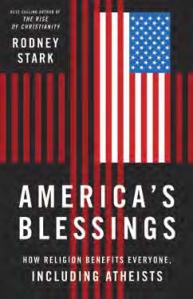 Rodney Stark, America’s Blessings: How Religion Benefits Everyone, Including Atheists (West Conshohocken, PA: Templeton Press, 2012). $24.95, 208 pages.
Rodney Stark, America’s Blessings: How Religion Benefits Everyone, Including Atheists (West Conshohocken, PA: Templeton Press, 2012). $24.95, 208 pages.
Is religion good or bad for society?
Read prominent atheists, and the answer is clearly negative. Richard J. Dawkins describes religion as a “delusion.” Christopher Hitchens argues that “religion poisons everything.” And Victor J. Stenger quips, “Science flies us to the moon. Religion flies us into buildings.”
Read Rodney Stark’s new book, on the other hand, and you’re likely to draw an entirely different conclusion. “Americans benefit immensely from being an unusually religious people—blessings that not only fall upon believers but also on those Americans who most oppose religion.” Interacting with a wide-ranging bibliography of over 350 studies (listed at the back of the book), Stark argues that, compared to less religious and nonreligious people, religious people
- engage in less criminal behavior and more prosocial behavior (chapter 2);
- experience higher marital happiness and lower divorce rates, while producing more and better-behaved children (chapter 3);
- report more and better sex with their spouse, and less cheating (chapter 4);
- experience better mental health, and probably better physical health too (chapter 5);
- give more generously in terms of money and time (chapter 6);
- and are better educated, more successful, and less credulous (chapter 7).
Between the atheists and Stark, Stark has the better argument. Across a wide range of metrics, religion is socially useful. Why is this the case? Is religion’s social utility the result of religious belief, religious practice, or some combination of both?
Throughout the book, Stark correlates weekly attendance at a religious service with desirable social outcomes. The higher the attendance rate, the higher the desirable social outcome. In other words, he focuses on religious practice. Religious belief rarely factors into his argument, and when it does, in only the most general way. For example, religion gives people hope, and hopefulness correlates with better mental health. Beyond such a generality, however, Stark does not argue that some religious beliefs have better social outcomes than others. The data only show that religious practice correlates with desirable social outcomes.
This correlation generates difficulties for both believers and nonbelievers. On the one hand, the social utility of religion does not prove its truth. Stark’s evidence doesn’t control for theological differences between religions. And perhaps the desirable social outcomes are produced less by the religious element than by the social element. People who meet together weekly are, by definition, more prosocial than those who don’t, after all. This is the difficulty religious believers face as they look at Stark’s argument.
On the other hand, religion seems to have a unique power to bind people together in community. This is a problem for atheists, it seems to me, because it entails acknowledging that false beliefs may have beneficial social effects. (“False,” that is, from an atheist point of view.) Critiquing those false beliefs might have deleterious social consequences. Ironically, then, atheists who desire a healthy society might want to tone down their critiques of religion, lest declining religious practices lead to increasing antisocial behaviors.
In sum, religion is socially useful. Whether that’s proof of the truth of religion is another matter. But in the American context, religious practice has indeed been a blessing for both individuals and communities in many ways.
P.S. If you found my review helpful, please vote “Yes” on my Amazon.com review page.


In Chapter Two of “America’s Blessings”, Dr. Stark tabulates crime in Western Europe (Table 2.1) showing that incidences of burglary, theft and assault are lower in the US than in listed nations and by this attempts to correlate crime with religiosity.
Dr. Stark seriously misused UNODC data in this table and it is clear that no correlation between crime and religiosity can be measured with any statistical certainty. Shame on Dr. Stark. Please see my analysis here: http://lucymcgee1.blogspot.com/
Regards,
Lucy Mcgee